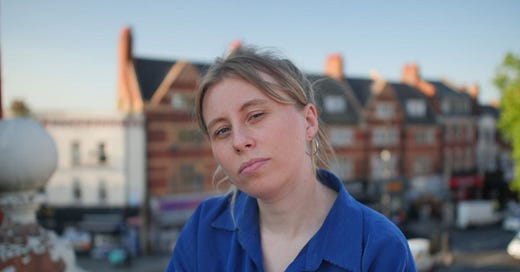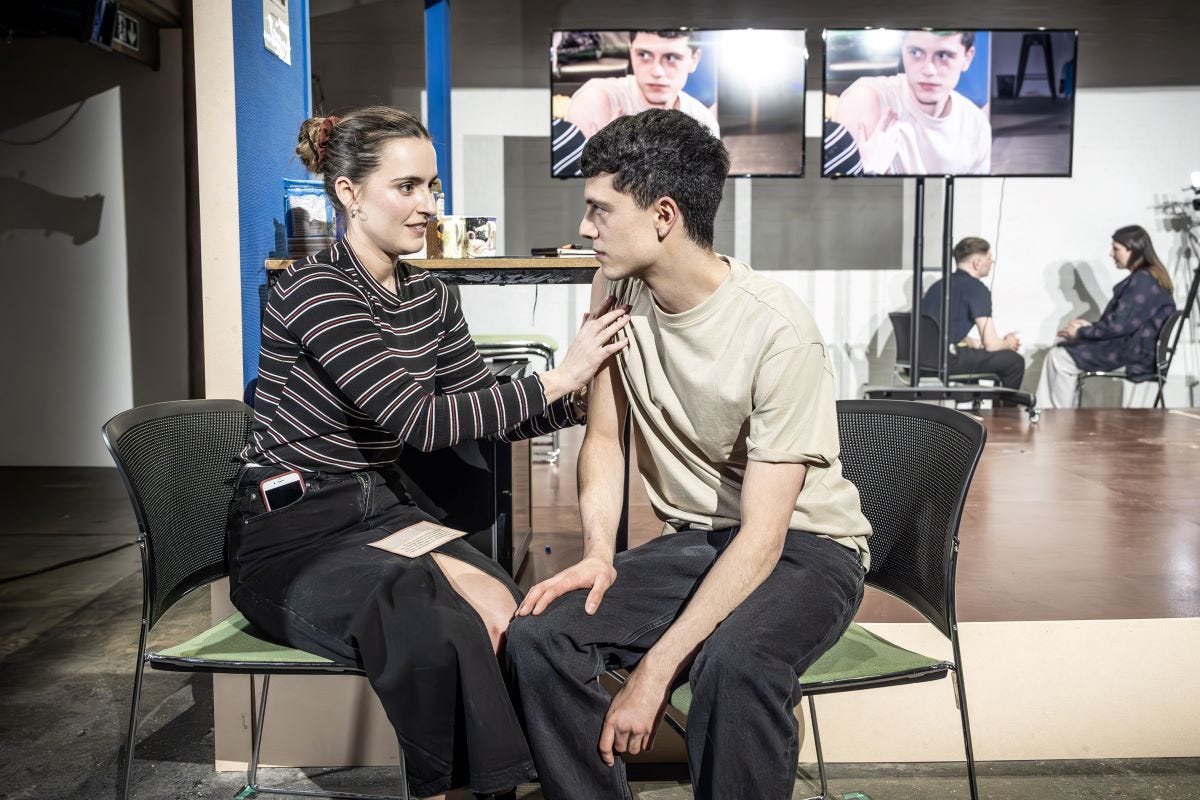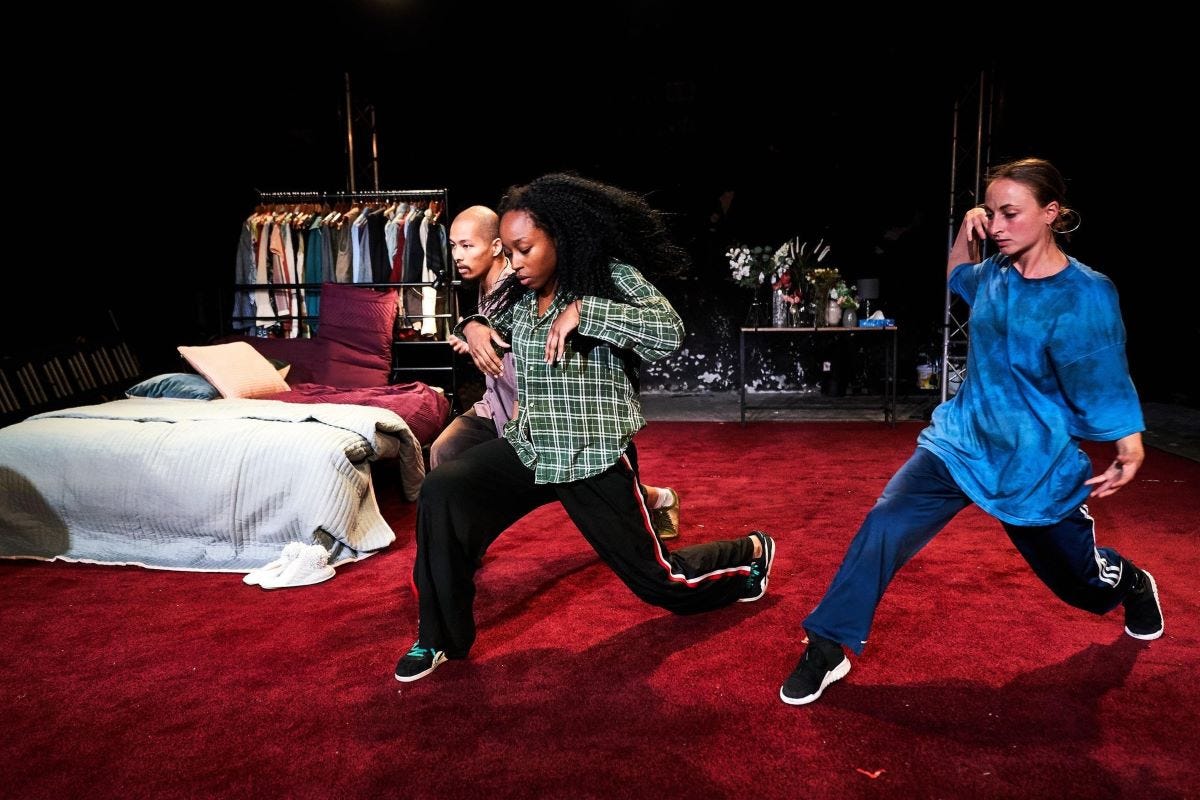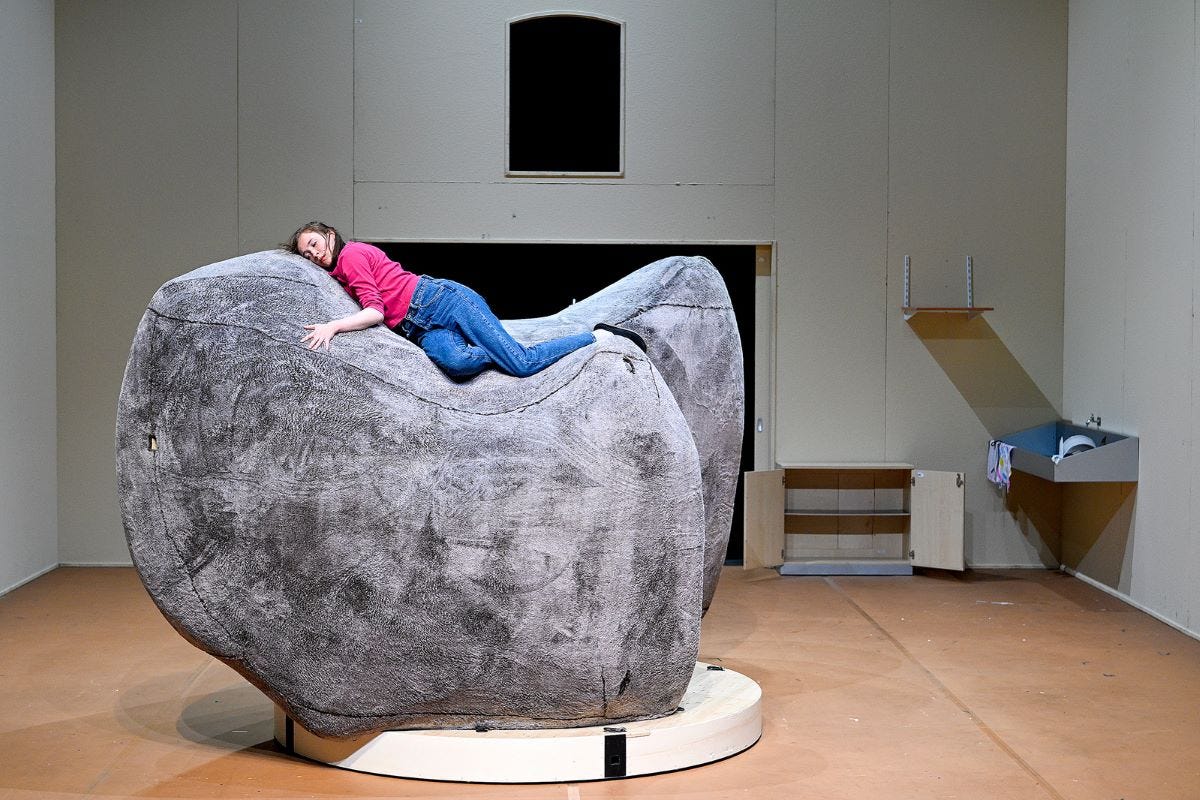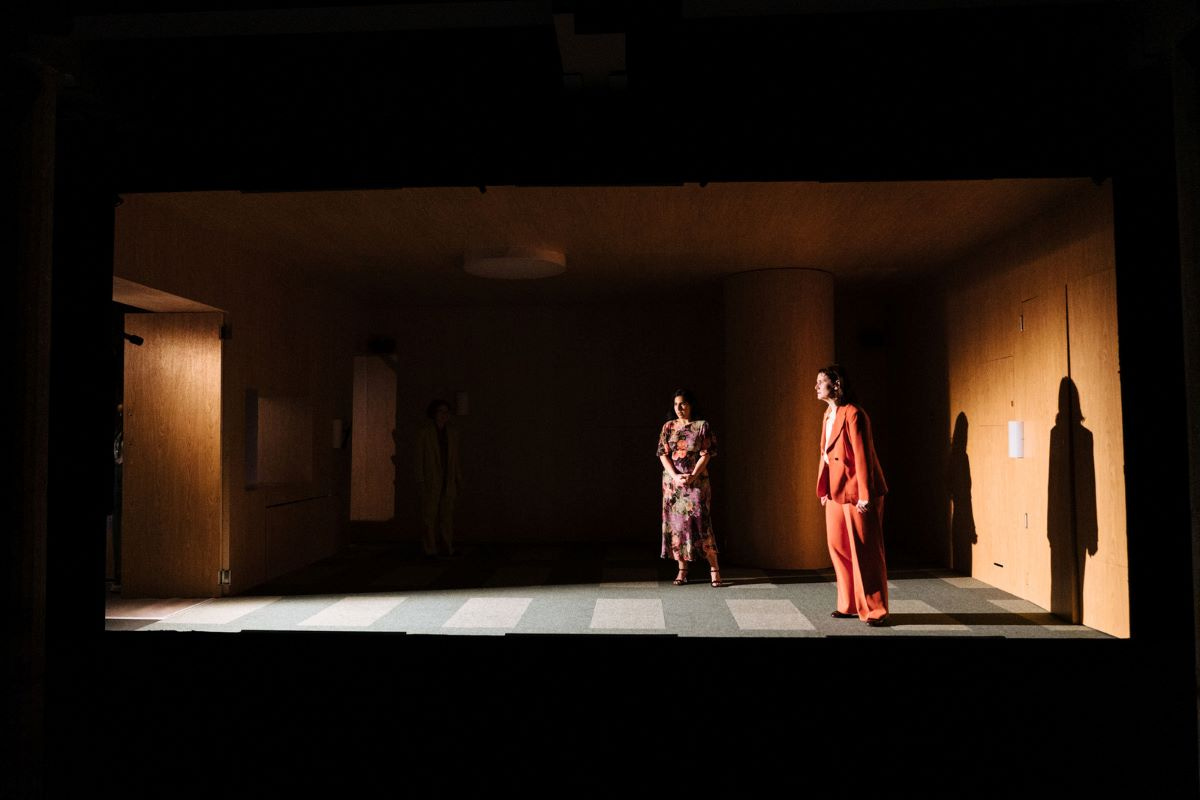"The best music comes from people jamming and seeing what happens. The same should be true of theatre..."
Director Jaz Woodcock-Stewart, founder of experimental company Antler, on staging Sami Ibrahim's new play Multiple Casualty Incident at the Yard Theatre. Plus: three shows to see next week.
Hello, and welcome to The Crush Bar, a newsletter about theatre written by Fergus Morgan.
This is the free, Friday issue, which usually contains a Q&A with an exciting theatremaker or an essay on a theatre-related topic. This week, there is an interview with director Jaz Woodcock-Stewart, whose production of Sami Ibrahim’s Multiple Casualty Incident is currently running at the Yard Theatre. After that, there are your usual three show recommendations for next week: one in Stratford, one in Manchester and one in Scotland.
In case you missed it, here is Tuesday’s issue of Shouts And Murmurs, which is a weekly round-up of the most interesting reviews, interviews and articles about theatre elsewhere. This one contains a bit about the revolving door at DCMS; a look at the reviews of Testmatch, The Other Boleyn Girl, The Legend Of Ned Ludd and more; and some more links to click, including a brilliant essay by French writer Edouard Louis on theatrical adaptation.
You can get Shouts And Murmurs straight in your inbox every week by signing up as a paid supporter of The Crush Bar for £5/month or £50/year. If you don’t feel like paying but still want to get the newsletter, then just reply to this email saying so, and I will make that happen.
I am getting tantalisingly close to 100 paid supporters - there is currently 91 - and I would very much like to reach three figures at some point this Month. Go on. Help me out, why don’t you?
There are a couple more things you can do to support this newsletter: you can share it with anyone you think might enjoy it and encourage them to subscribe, and you can use it for promotional purposes. There is more info about that here. Right, that is enough from me.
Director Jaz Woodcock-Stewart has, by her own admission, “a confusing CV.”
Born in 1990, she grew up in the Black Country, then trained as an actor at East15 Acting School, before turning to directing shortly after graduating. In 2012, she founded theatre company Antler, through which she made devised work for the following seven years, alongside assisting Tim Crouch, Ivo Van Hove and Simon McBurney. Antler’s fringe hits included 2018’s Lands, which involved actor Sophie Steer bouncing on a trampoline for an hour and a half, and 2019’s Civilisation, a wordless work about grief devised with choreographer Morgann Runacre-Temple.
The success of Civilisation - the show toured to London, Manchester, Munich and Dresden - opened doors for Woodcock-Stewart. In 2022, she directed Lulu Raczka’s adaptation of Gulliver’s Travels at the Unicorn Theatre, Tim Foley’s Electric Rosary at Manchester Royal Exchange, and Margaret Perry’s Paradise Now! at the Bush Theatre, which was nominated for an Olivier Award. Last year, she devised a new adaptation of Medea, Jason Medea Medley, at Dresden’s Staatsschauspiel. Right now, her production of Sami Ibrahim’s new play Multiple Casualty Incident is running at the Yard Theatre.
You direct new plays. You devise your own shows. How many modes do you have?
I’d say I’ve got three modes. There’s me directing new writing, when I try and put myself to one side and serve exactly what it says on the page. I’m a bit of a purist about that. I think James Macdonald is such a class act in that respect. He is such a craftsman. He delivers the play, and that is actually really difficult.
Then there is me making work when there is no writing involved. That is a more organic, instinctive process, but it is also the most rewarding because it comes from my soul. Then there is a third mode, which I want to do more, which is me directing classics, following my instincts within the frame of a well-known play.
Have you found it hard to reconcile those different interests?
It can feel like, to get anywhere in this industry, you need to become a brand that can be sold to an extent. You need to become known as the person that is good at doing a specific thing. For the first few years of my career, I tried to do one thing, but I found it so mentally stressful to constantly be denying my other interests. I have learned to embrace them instead. I have learned to let my CV be confusing. That might mean that I am not anyone’s first choice for a project, but that is the only life for me. It is only by letting my CV be confusing that I have learned who I am as an artist.
Tell me about Multiple Casualty Incident.
Multiple Casualty Incident is about four doctors at an NGO, training to go out into a crisis in the Middle East. On a personal, micro level, it centres on an older white woman and a younger mixed-race guy and the toxic dynamic that develops between them. In a wider context, it is thinking about Western intervention in global politics and the complicated, destructive nature of that. Obviously, that subject has increased in intensity in the last year, but Sami actually wrote this play back in 2018.
What does the show look like on stage?
Sami is interested in big formal gestures. This play centres on the problematic roleplaying of moral dilemmas that the doctors do during their training. That roleplaying gets more and less real as we move through the play. As a director, I’ve tried to create a visual form that supports that storytelling. We are playing with theatre and live-streamed film. I know that has become a bit of a cliché, but it really is the perfect vehicle to explore these ideas about reality and fiction.
Is it fair to say that Jaz Woodcock-Stewart and The Yard Theatre are a good fit?
Definitely. I’ve always thought that The Yard would be the place where I can do what I’m interested in doing. Obviously, this time I am directing Sami’s brilliant play, but I would love to do some of my own devised stuff at The Yard in the future. It is a really bleak landscape if you are interested in making work without a writer, which I am, but they are so good at trusting artists here. It is an amazing place.
What is your origin story as a theatremaker?
I was born in 1990. I grew up in Stourbridge in the Black Country, outside Birmingham. I went to Birmingham Young Rep and did a bit of everything there. I trained as an actor at East15, alongside people like Charlie Josephine and Bryony Shanahan and Nasi Voutsas and the Police Cops boys. About one year out, I realised I was a director. I realised I needed to be on the outside to make good work.
In 2012, I founded Antler with pals and generated all my own work through self-producing, which was amazing but also absolute hell. I hustled and assisted and got shortlisted for stuff but didn’t win for ten years. Things took off after Civilisation. I took a massive risk with that show. Lots of people didn't understand it when I pitched it. The key people that came through for me were David Byrne at the New Diorama, BAC and HOME Manchester with free rehearsal space. And an ACE grant. It feels like, even though that was only 5 years ago, making Civilisation wouldn't be possible now. That's sad and scary.
I directed Lulu Raczka’s Gulliver’s Travels at the Unicorn Theatre in 2022. That was my first time being employed by a building. I directed Tim Foley’s Electric Rosary at Manchester Royal Exchange in 2022, too, and Margaret Perry’s Paradise Now! at the Bush Theatre. That was a big deal. I think people realised I could direct plays then.
How hard has it been to find theatres willing to stage your devised shows?
It’s weird. Civilisation is the piece of work that I’ve made that has connected with the most people and led to the most opportunities, but that was a devised piece that did not involve writing, yet most of the opportunities have been directing plays. Of course, I am happy to do that, especially if it is a brilliant play like this. I am very passionate about making devised work, too, though. A lot of the best music comes from people jamming around in a room and seeing what happens. The same should be true of theatre, but that way of making work is totally underfunded.
You have started working in Europe recently. How did that come about?
Civilisation won the Jury Prize at the Fast Forward Festival at Dresden’s Staatsschauspiel in 2021. That changed my life. I’d been nominated for awards before that but never won. I was used to being the bridesmaid. Even when I won, I didn’t realise what I’d won. In the UK, it would be a week’s R&D. In Germany, it was a whole show at a state theatre. Mind-blowing. That’s Germany for you, though. Every state has a theatre that gets more funding that our National Theatre.
When I went to work in Germany and was told I could do anything on stage, I had a bit of a meltdown. I was so used to pitching things and people saying no. We are so used to that austerity in the UK and I think that damages your imagination.
You made an adaptation of Medea called Jason Medea Medley. I’ve seen the production photos. What was that big thing you put in the middle of the stage?
That was just called the object. It was a big, furry thing. With that show, we were interested in Medea’s rage. We didn’t have her killing her children. We were not interested in showing that. We were interested in the things that might happen in a woman’s life that might push her towards destroying the thing she loves most.
Did you write the adaptation yourself?
I have a complicated relationship with the word write. I find it interesting that it is playwright, like play-builder, rather than playwrite. I feel like that is what I do. I build something. That might involve writing. It might not. My favourite thing is to guide actors through an improvisation and to edit what they come up with. I am much more interested in that collaborative way of working than in writing in the traditional sense. It is responsible for so much good stuff. We wouldn’t have Curb Your Enthusiasm without that way of working. We wouldn’t have the movies of Mike Leigh or Joe Swanberg. I think theatre is missing out on that way of working a lot.
You have assisted some big directors, too: Ivo Van Hove on Lazarus, Network and All About Eve, and recently Thomas Ostermeier on An Enemy Of The People.
I thought I’d hung up my associate boots before An Enemy Of The People, as I’d not done it for a few years. It came up on OpenHire, though, and I was free. I would say that Thomas is probably the practitioner that has influenced me the most over the last ten years. The acting I’ve seen in his shows is the best I’ve ever seen.
You are directing Grud by Sarah Power at the Hampstead Theatre in June, too.
Sarah is an amazing new writer. This is her second play. It is a three-hander about a relationship between a daughter and her alcoholic father. That is the quick way of describing it. Sarah’s work is so dramaturgically rigorous and her characters are so beautifully drawn. My agent sent it to me and I was really moved by it.
I loved the Antler shows Civilsation and Lands. I particularly liked it when you made Sophie Steer bounce on a trampoline and Leah Brotherhead do a jigsaw in Lands.
I recently became obsessed with [Sanford] Meisner, the acting practitioner. He has this exercise in which one person does a task, and another person needs something from that person. It is a really fundamental acting exercise. I realised that is exactly what was happening in Lands. I’d kind of arrived at it myself organically, which is strange and nice.
You haven’t done anything as Antler for a while, though. Is Antler dead now?
Antler isn’t dead. It might be morphing into something else, though. Eve Allin, my producer, and I are planning something for later this year. The hustle continues.
Multiple Casualty Incident is at the Yard Theatre until June 8. For tickets, click here.
Three shows to see next week
The Buddha Of Suburbia - RSC, until June 1
Director Emma Rice’s company Wise Children and the Royal Shakespeare Company collaborate to adapt Hanif Kureishi’s much-loved 1990 novel for the stage. Written and directed with typical brio by Rice, it tells the sprawling, sex-filled story of British-Indian Karim and his family and friends through the tumultuous 1970s. It has garnered some glowing reviews - five stars in The Times and The Telegraph - and a transfer looks likely. You can get tickets for its Stratford run via the button below.
Maggie and Me - various, until June 15
The National Theatre of Scotland’s latest show is an adaptation of Damian Barr’s 2013 memoir about growing up gay in North Lanarkshire in the 1980s. Written by Barr and acclaimed playwright James Ley - who penned Love Song To Lavender Menace, Wilf and Ode To Joy and directed by Suba Das, it opens at the Tron Theatre in Glasgow next week before touring until mid-June. You can get tickets via the button below.
Sweat - Manchester Royal Exchange, until May 25
American playwright Lynn Nottage won her second Pulitzer Prize for Sweat in 2017. Set in a bar somewhere in the Rust Belt, it focuses on the lives of a group of female factory workers, deftly documenting the decline of American industry along the way. Lynette Linton’s UK premiere was a huge hit back in 2018. Now, Jade Lewis is staging an in-the-round revival in Manchester. You can get tickets via the button below.
That’s all for this issue
That is it for this week. If you want to get in touch about anything raised in this issue - or anything at all, really - just reply to this newsletter or email me at fergusmorgan@hotmail.co.uk. Or you can find me on Twitter/X, where I am @FergusMorgan.
A quick reminder of the ways you can support The Crush Bar. You can share it. You can use it for promotional purposes. And you can become a paid supporter, which means you get an extra weekly email, Shouts and Murmurs, every Tuesday. There are currently 2870 subscribers, 91 of whom are currently paid supporters. If you would like to join them, you can do so above.
Fergus

